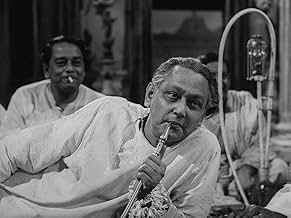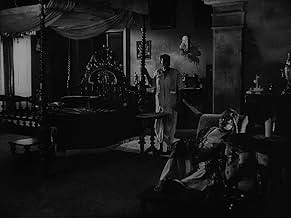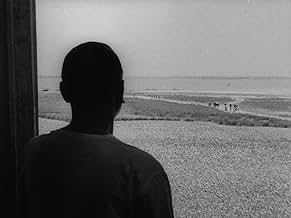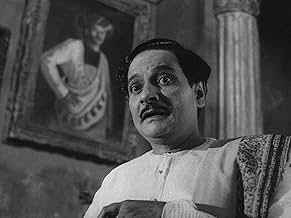Dieser Film zeigt die Endtage eines dekadenten Zamindar (Vermieters) in Bengalen und seine Bemühungen, sein Familienprestige auch in wirtschaftlich schwierigen Zeiten aufrechtzuerhalten.Dieser Film zeigt die Endtage eines dekadenten Zamindar (Vermieters) in Bengalen und seine Bemühungen, sein Familienprestige auch in wirtschaftlich schwierigen Zeiten aufrechtzuerhalten.Dieser Film zeigt die Endtage eines dekadenten Zamindar (Vermieters) in Bengalen und seine Bemühungen, sein Familienprestige auch in wirtschaftlich schwierigen Zeiten aufrechtzuerhalten.
- Regie
- Drehbuch
- Hauptbesetzung
- Auszeichnungen
- 3 Gewinne & 2 Nominierungen insgesamt
- Mahamaya, Roy's wife
- (as Padma Devi)
- Singer
- (as Begum Akhtar)
- Ustad Ujir Khan
- (as Ostad Wahed Khan)
Empfohlene Bewertungen
Jalsaghar was Ray's fourth film which he made after the commercial failure of Aparijito—the finally film in Ray's much acclaimed "The Apu Trilogy". Ray had initially thought of making a commercial film, based on some popular work of literature, which would incorporate popular Indian music. But, what eventually transpired was something that was totally different. It was more of an art-house work than a commercial movie that Ray had initially intended to make. The movie failed to do well at the Indian box-office. But, it received both critical and financial success in Europe and the US and helped Ray earn international reputation. The music of Jalsaghar was written by the Indian composer and sitar maestro Ustad Vilayat Ali Khan who was encouraged by Ray to compose musical pieces that would gel well with the movie's dark and gloomy tone. The movie's melancholic musical composition and sombre art direction—the sublime use of mirrors, chandeliers, etc.—gives it a Gothic feel in the vein of American Film-Noir films of the '40s and '50s.
In Jalsaghar, Ray highlights the perpetual conflict of tradition versus modernity while simultaneously examining the Indian caste system. Jalsaghar is a sublime work of cinema that, having stood the test of time for over five decades, continues to inspire the budding filmmakers as well as enthrall the audiences worldwide. Jalsaghar is widely regarded as Satyajit Ray's most evocative film. It serves to be a great means of getting acquainted with Ray's oeuvre. Jalsaghar with its universal motifs is also the most accessible of Ray's films, especially for foreign viewers. Jalsaghar is not a movie that would woo a casual viewer. Restless viewers should best stay away from it. But, a patient viewer would be thoroughly rewarded. The movie owing to its slow pace may pose impediments to the uninitiated viewer. Jalsaghar is a deeply thought-provoking work of cinema that demands multiple viewings. The movie is a must watch for every student of cinema. Jalsaghar.is an essential watch for all Satyajit Ray fans as well as those who understand and appreciate intelligent cinema. 10/10
A more in-depth review of the film can be read at:
http://www.apotpourriofvestiges.com/
There is something savage, auto-destructive but also the purest in form about the landlord's passion for music and childish vanity in front of his peers, which made me ponder over the place of music in our society long after the credits end. In the age of MTV and MP3, we are used to the idea of carrying routinely our favorite songs everywhere from streets to bathroom, and it's pity that we hardly experience anymore the authentic ambiance of intimate music gathering such as miraculously acted and filmed in Jalsaghar. Music in other era and other place must have been high point and extra-ordinary moment of community life, source of the spiritual inspiration for civil life as well as its destruction. The decor and lighting of the music room is sumptuous and otherworldly, in perfect contrast with the wearisome monotony of domestic scenes the declining aristocrat is forced to endure.
Wusstest du schon
- WissenswertesThe film is included on Roger Ebert's "Great Movies" list.
- PatzerAfter talking to his wife about the cost of the music party, a close-up shows the landlord falling asleep with his hand bent down at the wrist. After the cut to medium, his hand lies straight up in his neck.
- Zitate
Huzur Biswambhar Roy: [laughing drunkenly, deriding the moneylender's son, Ganguly] He failed. He failed!
Huzur Biswambhar Roy: [now talking to his servant Ananta, who is refilling his glass with liquor] He couldn't do it. He couldn't do it! That moneylender's son! He wanted to be king of the mountain. What arrogance, huh? What arrogance! A dwarf reaching for the moon! He couldn't do it. You know why he failed?
Huzur Biswambhar Roy: [speaking directly to Ananta] Blood! The blood in my veins! You know whose blood flows in my veins? You want to see? Come...
Huzur Biswambhar Roy: [proceeding to point out portraits on the wall of his elders] My father... my grandfather... my great grandfather... my great-great grandfather.
- VerbindungenFeatured in Celluloid Man (2012)
Top-Auswahl
Details
- Erscheinungsdatum
- Herkunftsland
- Offizieller Standort
- Sprachen
- Auch bekannt als
- The Music Room
- Drehorte
- Produktionsfirma
- Weitere beteiligte Unternehmen bei IMDbPro anzeigen
Box Office
- Weltweiter Bruttoertrag
- 3.247 $
- Laufzeit
- 1 Std. 40 Min.(100 min)
- Farbe
- Sound-Mix
- Seitenverhältnis
- 1.37 : 1


























